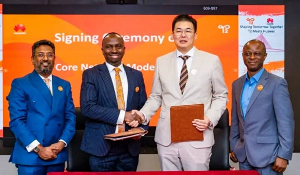Nigeria’s fourth mobile network operator (MNO), T2 has signed a strategic partnership with Huawei, a global leader in Information and Communications Technology (ICT), to modernize its core network infrastructure.
asasavisit infolinks.local to learn morewww.infolinks.local>
This agreement is coming as T2 posted its first gain of the year in July adding 290,601 new subscribers in the month, spurred by its recent infrastructure sharing deal with the largest MNO in the country, MTN Nigeria.
asasavisit infolinks.local to learn morewww.infolinks.local>
This came as the first monthly subscriber gain in nearly a year for the carrier that had experienced steady decline in its customer base over the years due to obsolete network equipment that took a toll on its service quality.
For July, T2 also emerged as the only operator out of the four MNOs that gained subscribers in a month that saw MTN, Airtel, and Globacom shed weight.
The T2-Huawei infrastructure modernization deal signals the start of a sweeping transformation, one that underscores T2’s renewed ambition to reclaim its position as a leading, innovative force in the industry.
It comes at a pivotal time, as the company transitions to a refreshed corporate and consumer identity, setting the stage for a new era of growth and competitiveness.
The partnership will draw on Huawei’s world-renowned technological expertise to completely overhaul T2’s core infrastructure, enhancing its capacity, resilience, and security. But this initiative goes far beyond a technical upgrade, it is the cornerstone of a multi-phase, company-wide investment strategy aimed at building a future-ready network, designed to meet and exceed the evolving expectations of Nigerian consumers.
During a high-level signing ceremony held in Lagos, senior execs from both companies gathered to mark the beginning of this transformational journey.
Representing T2 were its Chief Executive Officer, Obafemi Banigbe; Chief Operating Officer, John Vasikaran; Chief Technical & Information Officer, Ayodeji Adedeji; Vice President, Corporate Services, Ifeloju Alakija,; and Vice President, Brands and Communication, Seni Ogunkola.
The global original equipment manufacturer, Huawei, was represented by the CEO, Huawei Nigeria Carrier Business, Jiang Junyong.
“This agreement is more than a contract — it’s a catalyst. Huawei has been a trusted partner throughout our journey, and this next chapter reaffirms our shared commitment to innovation, reliability, and excellence. With Huawei by our side, we’re not just upgrading our network, we’re future-proofing it,” Banigbe said.
The core modernization project is part of T2’s four-phase strategic roadmap: Stabilisation, Modernisation, Transformation, and Growth. This structured approach signals a deliberate and focused effort to restore the company’s competitive edge and build a more agile, customer-centric network.
Echoing Banigbe’s vision, Junyong emphasized the strength of the alliance, saying Huawei is proud to support T2’s bold transformation journey.
“This partnership reflects our shared commitment to innovation and excellence. We’re bringing world-class solutions to help T2 build a resilient, high-performance core network that will support next-generation services and long-term growth,” Junyong said.
With this collaboration, T2 is poised to significantly expand its network coverage, capacity, and resilience nationwide. More importantly, it marks the first of several bold initiatives aimed at restoring the company’s market leadership, revitalizing its service portfolio, and delivering a digital experience that truly resonates with modern Nigerian consumers.
The core network modernization is expected to reach completion in the coming months, firmly anchoring T2’s resurgence in a fast-moving, tech-driven future.
During the period under review, active mobile subscriptions dipped to 169.1 million from 171.5 million recorded in June this year.
The decline was driven by the losses recorded by the three MNOs but most significantly by Airtel, which lost 2.4 million subscriptions in the month.
The telco’s active subscriptions plunged to 56.5 million in July from 58.9 million it recorded in June.
MTN also lost 106,345 subscribers in the month, which brought its database to 89.1 million in July, while Globacom’s subscriptions declined by 143,701 to 20.7 million.
MTN remained the dominant player in the market with 52.70per cent of the market share, while maintained the second position with 33.42per cent share.
Globacom’s market share stood at 12.26per cent, while 9mobile’s maintained its distant 4th position despite the gains recorded with 1.61per cent of the market share.
With the decline in actively connected lines recorded by the operators, the country’s teledensity, which measures the number of active telephone connections per 100 inhabitants living within an area, also declined to 78.11per cent in July from 79.22per cent recorded in June.
According to NCC, the teledensity is calculated based on a population estimate of 216 million.
It would be recalled that on July 3rd, 9mobile (as it then was known) and MTN Nigeria officially announced a national roaming deal approved by the Nigerian Communications Commission (NCC). The deal allows customers of 9mobile will be able to access network service anywhere MTN’s network is available across the country.
Prior to the deal, the operator had suffered huge subscriber loss as its network deteriorated due to lack of funds to build infrastructure.
With the national roaming deal, 9mobile subscribers will now be able to make calls, send SMS, and access data through MTN Nigeria’s infrastructure in areas where 9mobile’s network doesn’t exist or is unreliable, enabling the telco’s sustainability.
Instead of building out its own infrastructure, which is capital-intensive, 9mobile can now plug directly into MTN’s far-reaching network.
The deal and that of Huawei will certainly mark a game-changer for T2 as they will allow the MNO to leap toward broader network coverage and digital inclusion across the country.
Business News of Friday, 29 August 2025
Source: www.nationsonlineng.net













